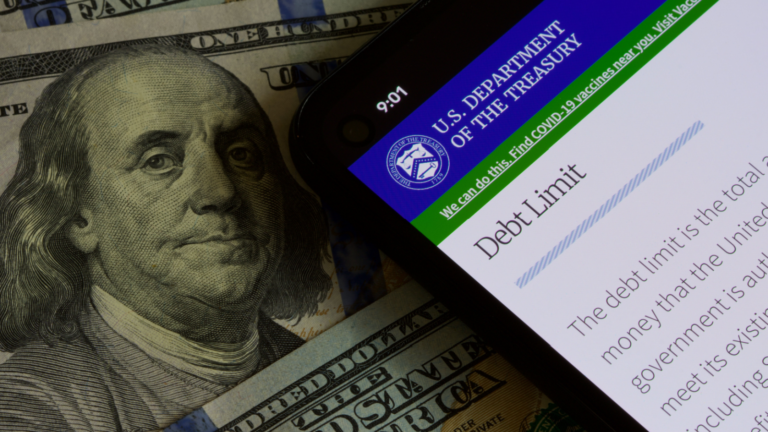As the U.S. continues to navigate its current debt crisis, fears of a stock market crash are in focus. Wall Street is currently eying a potential “X-Date,” when the government defaults on its debt.
According to Ralph Axel, rates strategist at Bank of America, a U.S. debt default would have dire consequences for both the equity and fixed-income worlds.
“..this would represent the first time in history that the U.S. would default on any of its obligations due to the debt-ceiling law.
We think [a default] would include a fall in equity and bond prices, potentially testing Treasury market functioning and liquidity.”
Reasonably so, the U.S. has never defaulted on its debt in its history. To call the event a bearish catalyst would be phrasing it mildly.
The Debt Limit and the Economy
If you recall, the country has been operating past its debt limit since January. And in the time since, the Treasury Department has worked frantically to pay down all the government’s essential functions through its “extraordinary measures” powers. Unfortunately, however, a default can only be staved off for so long.
Currently, economists project the country is on track to default by mid to late August, assuming Congress doesn’t pass legislation raising the country’s debt limit between now and then.
In that regard, it’s unclear when or if tensions between Democrats and Republicans will ease enough to reach a compromise. This has resulted in comparisons to the 2011 debt crisis, in which the country narrowly avoided default through some last-minute Congressional maneuvering. Indeed, raising the debt ceiling is actually a relatively common occurrence for the U.S., 78 times since 1960. However, operating this far past the limit happens markedly less frequently.
Will the “X-Date” Result in a Stock Market Crash?
The big question on many investors’ minds is what a theoretical default would mean for financial markets. It’s tough to say precisely, but at the very least, nothing good.
As per Mark Zandi, Chief Economist at Moody’s Analytics, in the case of a default, the U.S. economy could lose as many as seven million jobs and immediately stumble into recession.
In written testimony to the U.S. Senate Urban Affairs Committee on Economic Policy on March 7, Zandi states a default would be “catastrophic.”
“Global financial markets and the economy would be upended, and even if resolved quickly, Americans would likely pay for this default for generations, as global investors would rightly believe that the federal government’s finances have been politicized and that a time may come when they would not be paid what they are owed when owed it. To compensate for this risk, they will demand higher interest rates on the Treasury securities they purchase. That will exacerbate our daunting long-term fiscal challenges and be a lasting corrosive on the economy, significantly diminishing it.”
That said, investors are currently taking a sort of laissez-faire, “been there, done that” attitude toward the brewing debt crisis. Given the country’s track record, it may seem reasonable to assume the debt ceiling will be raised once again. Hopefully, that remains true this time around. The alternative, unfortunately, could be costly to all parties involved.
Make no mistake, however, should the government fail to raise the debt limit, a default would be devastating. As it stands, the country owes more than $24 trillion in accounts payable, including a large portion held by foreign nations. Zandi also wrote:
“And if policymakers actually do fail to increase or suspend the limit 3 before the Treasury runs out of cash and defaults on its obligations, interest rates will spike and stock prices will crater, with enormous costs to taxpayers and the economy”
On the date of publication, Shrey Dua did not hold (either directly or indirectly) any positions in the securities mentioned in this article. The opinions expressed in this article are those of the writer, subject to the InvestorPlace.com Publishing Guidelines.

